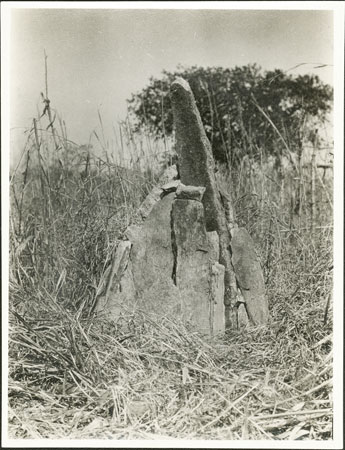Moro Meza grave

103 x 75 mm | Print gelatin silver
Condition:
Sulphide staining [EE 1989]
Date of Print:
Unknown
Previous PRM Number:
EP.M.4
Previous Other Number:
VII 8
Accession Number:
1998.345.4
Description:
The grave of a man or woman once in the centre of a homestead but now in the bush, consisting of a small mound of earth with flat slabs of stone leaning against each other over it.
One larger slab is placed as a pointer, towards the east for a man's burial and to the west for a woman, indicating the rising (male) or setting (female) sun.
Such megalithic grave markers were peculiar to the Moro Meza, and was not generally found among other so-called Moro groups neighbouring.
Photographer:
Edward Evan Evans-Pritchard
Date of Photo:
1927
Region:
[Southern Sudan] Western Equatoria Amadi District
Group:
Moro Meza
PRM Source:
Edward Evan Evans-Pritchard
Acquired:
Donated 1966
Other Owners:
E. E. Evans-Pritchard Collection
Class:
Death , Shelter
Keyword:
Grave , Grave Marker , Megalith
Documentation:
Original catalogue lists in Manuscript Collections. Additional material in related documents files. [CM 27/9/2005]
Primary Documentation:
PRM Accession Records - Accession Book Entry [p.
98] 1966.27 [1 - 24] G[ift] PROFESSOR E.
E.
EVANS-PRITCHARD; INST.
OF SOCIAL ANTHROPOLOGY, 51 BANBURY RD.
OXFORD - 1966.27.19 - S.
SUDAN, DARFUNG.
VARIOUS TRIBES.
Box of negatives in envelopes, [1 - 242] & 1966.27.20 - Box of prints of these negatives [refers to object 1966.27.19] [1 - 242], in envelopes.
Note on print reverse ms pencil - "Grave VII - 8"
Notes on card mount ms pencil - "SS RHS 8.89"
Note on print reverse ms pencil - "Grave VII - 8"
Notes on card mount ms pencil - "SS RHS 8.89"
Other Information:
In Megalithic Grave-Monuments in the Anglo-Egyptian Sudan and other parts of East Africa, Antiquity, IX, No.34 1935, page 156 E.
E.
Evans-Pritchard notes that '[t]he structure of the pyramid type of grave in Mise country ...
consist[s] of slabs of flat white granite leaning together in pairs one above another with one slab much taller than the rest pointing either to the rising or the setting sun.
If the grave contains a man the stone pointer leans to the east, whereas if it houses a woman it points to the west; because when a man rises from sleep he shades his eyes and looks to the rising sun which marks the beginning of a hunter's day; whereas when a woman wakes from sleep in the afternoon, she shades her eyes to the west, for when the sun goes down in the west she prepares the evening meal.' [Chris Morton 26/2/2004]
Recorder:
Christopher Morton 26/2/2004 [Southern Sudan Project]

